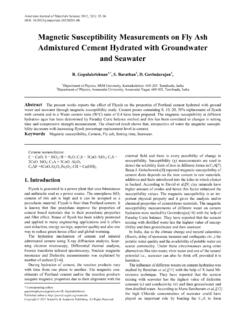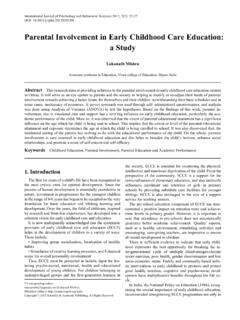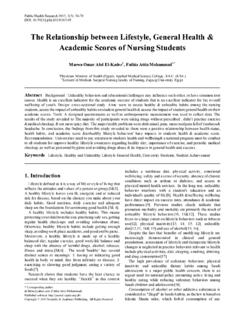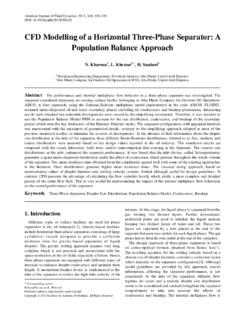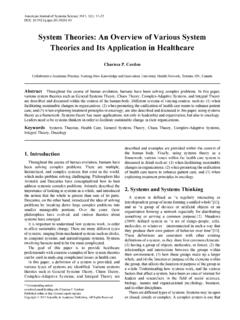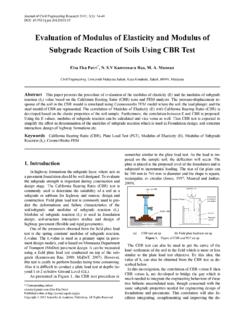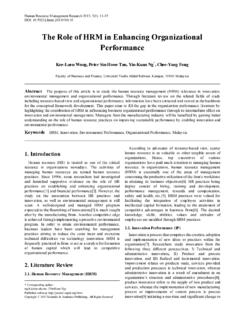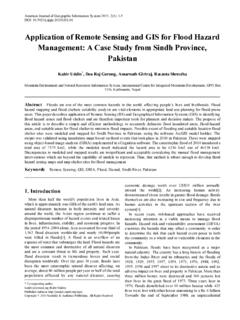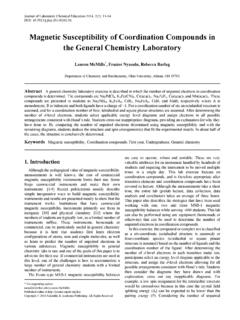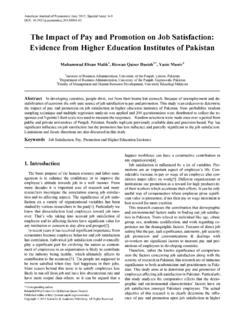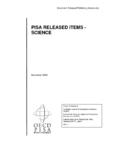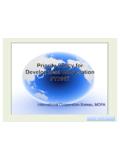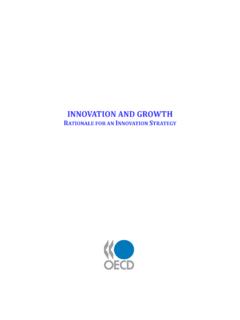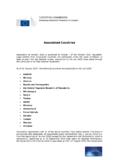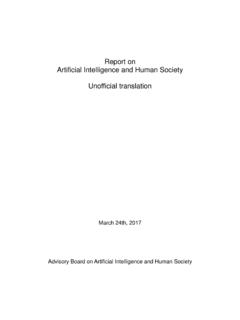Transcription of WHO, definition of health, spirituality, the Health ...
1 International Journal of Ap p lied Sociolo gy 2012, 2(6): 71-77 DOI: Does a Multi-Dimensional Concept of Health Include Spirituality? Analysis of japan Health Science council s Discussionson WHO s definition of Health (1998) M as ak o N ag as e Faculty of Health Care and Nursing, Juntendo University, Chiba, 279-0023, Jap an Abs t rac t The Health Science council of japan proposed to include the term spirituality in W HO s defin ition of Health over three meetings. However, no consensus on the proposal was achieved. This study uses the minutes of the meetings to explo re the members imp licit understanding of Health , varied interpretations of spirituality , an d reservations against the inclusion of spirituality in the official defin ition of Health .
2 By analyzing the Japanese perspective on the subject, this study seeks to contribute to the conceptual defin ition of Health and elucidate the challenges involved in incorporating spirituality as a dimension of Health in the field of contemporary med ical care. Ke y wo r ds W H O, De fin it io n of Healt h , Sp ir it u al it y , the Hea lth Science council of the Former Ministry of Hea lt h an d W elfare 1. Introduction In 1999, the field of Japanese medical ca re witnessed a sharp increase in the number of academic publications on s p irit u alit y[1] . Possibly, the increased focus on spirituality stemmed fro m the p roposal, submitted between 1998 and 1999, to revise the definition of Health by including the aspect of spirituality in the preamble to the World Health Organization (W HO) s Charter.
3 A rev ision in the definition was proposed at the 101st session of the WHO Executive Bo ard by the WHO Regional Office for the Eastern Mediterranean, wh ich included me mbe rs fro m Isla mic member countries. The proposal sought to modify the definition of Health by adding the underlined wo rd as follows: Health is a dynamic state of co mplete physical, mental, spiritual, and social we ll-being and not merely the absence of disease or infirmity [2] . Although many Japanese people participate in relig ious cere monies that include weddings, births, funerals and New Year p rayers, there is a little sense of affiliation to any specific religious , there are many who consider themselves not relig ious , and according to a survey conducted by a leading Japanese newspaper[3], 76% do not believe in any religion.
4 On the other hand, 94% have a deep feeling of reverence towards their ancestors and 56% sense something in nature that surpasses the power of * Corresponding author: (Masako Nagase) Published online at Copyright 2012 Scientific & Academic Publishing. All Rights Reserved human beings . While keep ing a distance from any specific group, Japanese people tend to consider it important to have a deep respect for deities or powers that are beyond human understanding. The proposed definition differed fro m the orig inal in two aspects. First, the concept of Health was not identified as an individual s state of being healthy or ill but as a continuous and dynamic condition. Second, a spiritual dimension was added to the physical, mental, and social dimensions of Health .
5 The proposal was incorporated into the agenda of the 52nd World Health Assembly (WHA52) with 22 votes in favor, none against, and eight sp o ilt b allo t s . WHA52 was held fro m 17 25 May, 1999; however, the proposal to rev ise the WHO s defin ition of Health was not discussed. Unfortunately, in the subcommittee deliberations held prior to the General Assembly, it was decided that deliberations would not be held during the General A s s e mb ly[2] . Eiichi Na ka mura , a Japanese delegate attending the subcommittee meeting, was among those opposed to having deliberations at the WHA52 in favor ensuring more time for d iscussions ([4],[5] ).
6 Na ka mura s comments were considered reflective of the views of the Health Science council of the Former Min istry of Health and Welfare in japan , the only official body at the central government level to have held deliberations on the proposal to amend WHO s defin ition of Health , within japan . These deliberations have been the subject of a couple of studies on healthcare([6],[7] ). Both the studies confirm that the translation of the term spirituality represented a problem at the council meeting. Tanatsugu added that the me mbers in the deliberation council ultimately failed to 72 M asako Nagase: Does a M ult i-Dimensional Concep t of Health Include Sp irituality ?
7 Analy sis of Jap an Health Science Coun cil s Discussionson WHO s definition of Health (1998) arrive at a consensus on the differences between the words mental and spiritual . Th is lack of consensus is said to have contributed to Nakamura s stand at the WHA52 subcommittee. To date, there only exists a tacit acceptance of the notion of spiritual well-being within the conceptual dimensions of Health in the field o f nursing and welfare in japan . The true notion of spirituality and the challenges of incorporating it in the official defin itions of Health within contemporary medical care are yet to be fully explo red. This study attempts to address this gap through a retrospective analysis of the reasons that contributed to the disagreement a mong co mmittee me mbers of the Health Science council over the inclusion of spirituality in the definition of Health .
8 Unlike earlier studies that summarized the views of the officials of Health Science council , this study seeks to provide a detailed review of the proceedings by using the minutes of the meeting as investigative data. It answers questions such as who were the attendees at the deliberation council , what were their views, and how they were put forward and, more impo rtantly, what were the themes of conflict. By analyzing japan s perspective on Health and spirituality through the minutes of the Health Science council s deliberations, this study sheds light on the current challenges in defining Health as well the relationship between modern med icine and spirituality.
9 2. M e tho ds As mentioned earlier, the minutes of the meeting of the Health Science council of the Former Min istry of Health and Welfare that discussed the proposal to add spirituality to WHO s defin ition of Health were analyzed. Specifically, these minutes included records of three meetings: A. The 6th general meeting of the Health Science council (March 19 , 19 9 9) , B. The 14th meet ing of the Health Sc ience council s Research and Planning Co mmittee (April 12, 19 9 9), and 15th meeting of the Hea lth Science council s Research and Planning Co mmittee (April 19, 1999). The total number of attendees at each meeting and their do mains of expertise are listed in Table 1.
10 Excluding the Chairperson and overlapping participants, the number of committee me mbers at each meeting was 21. Most of the attendees were e xpe rts fro m the fie ld of natural sciences , while th ree b elo ng ed to no n-s cience dis the three meetings, there were a total of 27 attendees mo re than 80% o f the whole members. One of these members, who was an author, stated she was a Christian, but the religion of other members was unknown. The reasons for disagreement on the issue of including spiritual dimension in the defin ition o f Health are examined fro m two perspectives. The first exp lores the framework that governed the committee s discussions of the term Health .
